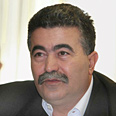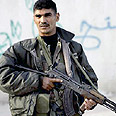

Defense Minister Amir Peretz said on Monday that terror groups should understand that the ceasefire agreement reached with Israel is no timeout, warning that Israel is ready to defend itself should attacks against its citizens and military resume.
"Terror groups should understand: we are not in timeout. We remain deployed for possible responses under different scenarios. I would like to stress that in addition to the ceasefire I have no intention of resting on my laurels, but to protect our citizens," he said during the Cabinet meeting in Jerusalem.
"Violations and the fire of Qassams yesterday were carried out by the Islamic Jihad. In the first hours 20 rockets were fired. Fire stopped in the afternoon. For the moment there is a commitment to preserve the truce," he said.
"The deployment of Palestinian forces by Abu Mazen (Palestinian President Mahmoud Abbas) is an important test for us. The deployment needs to take place in launching sites to prevent rocket fire. I ordered the IDF to set up coordination teams for the deployment of Abu Mazen's forces," he said.
'Egypt should play a leading role'
"The meaning of the deploying the forces by Abbas directly is a neutralization of Hamas. We shouldn't ignore the situation where the Authority's president who recognizes Israel took it on himself to act on the security front, as opposed to Hamas with which we have no contacts."
"Abu Mazen's latest efforts give an opportunity. I am not euphoric. We are following the developments and are acting carefully. I wish to stress that the pressure exerted by the IDF over the past few weeks caused the groups to agree and stop firing on their own initiative. The IDF, intelligence services and the southern command created an opening for the political echelon," he said.
Peretz added that preventing terror groups in Gaza from gaining military strength requires international involvement, saying the Egypt should play a leading role in this realm.
Meanwhile, the government approved Vice Premier Shimon Peres' initiative to transfer NIS 400 million (USD 90 million) for development projects in the Negev.
The fund includes moneys allocated to compensate residents of the western Negev affected by Qassam attacks.















